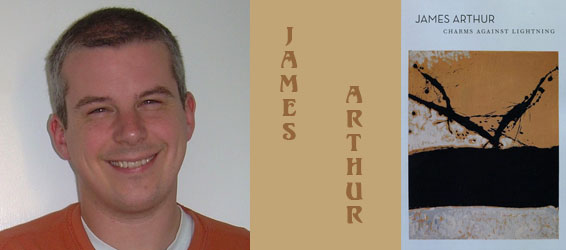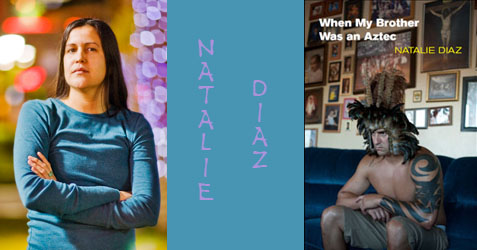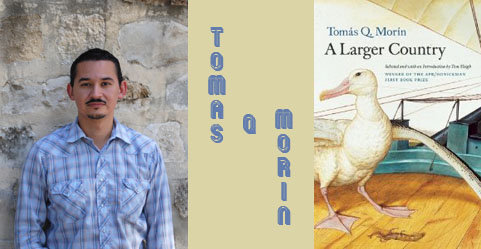James Arthur, Natalie Diaz, and Tomas Q. Morin
Monday, June 10 at 7:30 PM
SPC at 1719 25th Street
Host: Emmanuel Sigauke
James Arthur‘s poems have appeared in The New Yorker, The New Republic, Poetry, and The American Poetry Review. He has received the Amy Lowell Travelling Poetry Scholarship, a Wallace Stegner Fellowship, an Amy Clampitt Residency, and a Discovery/The Nation Prize. His first book, Charms against Lightning, is a poetic bildungsroman organized around the theme of awakening from a “ghost world” in order to journey toward a definition of selfhood. Romantic in spirit and contemporary in outlook, Arthur’s poems are rhythmical, elastic, and expressive. During 2012-2013, Arthur will be a Hodder Fellow at the Lewis Center for the Arts in Princeton. Charms against Lightning will be published by Copper Canyon Press in October 2012. http://www.jamesarthurpoetry.com/
The Land of Nod
Growing up, I barely knew the Bible, but read
and reread the part when Cain drifted east
or was drawn that way, into a place of desolation,
the land of Nod, there to begin, with a wife
of unknown origin, another race of men,
under the mark of God. As a boy, I thought Nod
would be a place where the blue scillas
would bloom grey, a country of the rack and screw,
the serrated sword, where the very serving cups
were bone. As a grown man, I’ve heard that Nod
never was a nation—of Cain’s offspring, or anyone—
but a mistranslation of “wander,” so Cain
could go wherever, and be in Nod. Far more
than in God, I believe in Cain, who destroyed
his own brother, and therefore in any city
could have his wish, and be alone.
The Kitchen Weeps Onion
The kitchen weeps onion
because the cook is dead. Pans strike chorus
and the ladles keep a knock-kneed stride.
Burners gleam more brightly. Chives,
chives, and chives. Everyone seems so tired
but the diners can’t sleep. The kitchen tonight
weeps onion, so everyone else must weep.
What’s the use in talking? Let’s touch,
and turn apart. The cook is quiet,
cold, unearthly, and the turnip
breaks its heart.
Natalie Diaz was born and raised in the Fort Mojave Indian Village in Needles, California. Her poetry and fiction have appeared in The Iowa Review, Prairie Schooner, Crab Orchard Review, Best of the West, The Speed Chronicles, and Sing: Poetry from the Indigenous Americas. After playing professional basketball in Europe and Asia for several years, she completed a poetry and fiction MFA at Old Dominion University. She lives in Mohave Valley, Arizona, and directs a language revitalization program with the last Elder speakers of the Mojave language. Her first book, When My Brother Was an Aztec, is a fast-paced tour of Mojave life and family narrative: A sister fights for or against a brother on meth, and everyone from Antigone, Houdini, Huitzilopochtli, and Jesus is invoked and invited to hash it out. When My Brother Was an Aztec will be published by Copper Canyon Press in May 2012. http://www.narrativemagazine.com/authors/natalie-diaz
A Woman with No Legs
for Lona Barrackman
Plays solitaire on TV trays with decks of old casino cards Trades
her clothes for faded nightgowns long & loose like ghosts Drinks
water & Diet Coke from blue cups with plastic bendy straws Bathes
twice a week Is dropped to the green tiles of her HUD home while
her daughters try to change her sheets & a child watches through
a crack in the door Doesn’t attend church services cakewalks or
Indian Days parades Slides her old shoes under the legs of wooden
tables & chairs Lives years & years in beds & wheelchairs stamped
“Needless Hospital” in white stencil Dreams of playing kick-the-
can in asphalt cul-de-sacs below the brown hum of streetlights about
to burn out Asks her great-grandchildren to race from one end of
her room to the other as fast as they can & the whole time she whoops
Faster! Faster! Can’t remember doing jackknifes or cannonballs
or breaking the surface of the Colorado River Can’t forget being
locked in closets at the old Indian school Still cries telling how
she peed the bed there How the white teacher wrapped her in her
wet sheets & made her stand in the hall all day for the other Indian
kids to see Receives visits from Nazarene preachers Contract
Health & Records nurses & medicine men from Parker who knock
stones & sticks together & spit magic saliva over her Taps out
the two-step rhythm of Bird dances with her fingers Curses in
Mojave some mornings Prays in English most nights Told me
to keep my eyes open for the white man named Diabetes who is out
there somewhere carrying her legs in red biohazard bags tucked
under his arms Asks me to rub her legs which aren’t there so I
pretend by pressing my hands into the empty sheets at the foot of
her bed Feels she’s lost part of her memory the part the legs knew
best like earth Her missing knee caps are bright bones caught in
my throat.
Tomas Q. Morin‘s poems have appeared in New England Review, Narrative, Boulevard, Slate, Threepenny Review, and Best New Poets. He has received scholarships from the Fine Arts Work Center, Bread Loaf Writer’s Conference and the New York State Summer Writers Institute. He teaches literature and writing at Texas State University. His debut collection of poems, A Larger Country, was chosen from more than one thousand manuscripts for the APR/Honickman First Book Prize. It charts the land we call memory, a place the dead and the outcast call home; the map that emerges shows us that while the terrain of memory may be rugged, filled with both joy and sorrow, it is also “the world we always said we wanted.” A Larger Country will be published by Copper Canyon Press in September 2012. With Mari L’Esperance he has also just edited Coming Close: Forty Essays on Philip Levine (Prairie Lights Books, 2013). http://www.tomasqmorin.com/
Laika
In ‘57 Sputnik 2 carried her into space
where the first bark went unheard.
Did she lick herself or nip at the whir
of the fan in that cabin? These concerns
were not important to science, unlike velocity,
heart rate, time of death. When my faith
in justice wavers I embrace my inner Greek
and butcher the sky, carve out a swath of stars
catching a curve of light millions of years old
and pretend they are the outline of a dog,
half-husky, half-terrier. I retreat to this fantasia
when another report of animal cruelty
soils further the already filthy news.
It was years before we knew
she didn’t last more than five hours
in that wretched kennel, weightless,
and think of the trash she could have rooted,
the black boots she could have shined
with a few well-placed curtsies
in deference to the great mutts of history—
think Khrushchev and Kennedy.
Sweet Laika, it has been decades since my last confession,
and my sins are many: in Kathmandu I herded strays
through the alleys, ticked their foreheads
and paws red, wept in gratitude when they licked my face
because now they might let me pass
through the gates of heaven with only a tender snarl
for having diced garlic, may the bulbs forgive me,
in the kitchens of Laos. I went my whole life
without seeing a dog struck by a car and then it was there—
have mercy upon the pronoun, I didn’t get out—
in the mirror, watching the Chevys and Fords,
pounding the pavement with its tail before the truck
hauling from Georgia who knows what,
and it was in that other Georgia, the colder one,
where I entered the life of a minor scientist,
hunting the bakeries of Moscow for tea cake
one day, the trash heaps the next for any dog
the size of a breadbox, one not much bigger
than the tabby at the foot of my bed dreaming
about the injustice of wings, unaware of my past
allegiances, that I was born under the sign of the dog,
that I have lived and died a traitor to my own kind.







